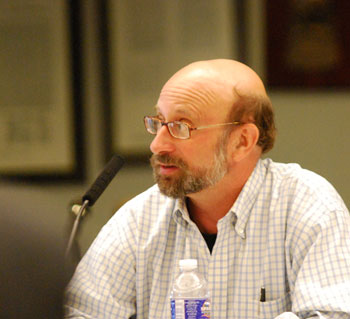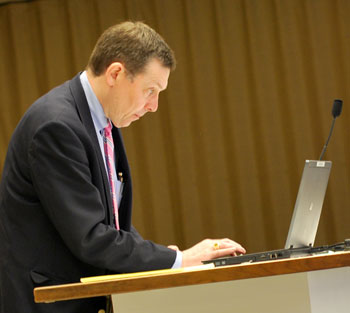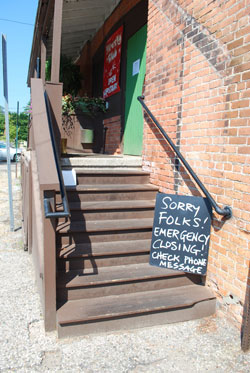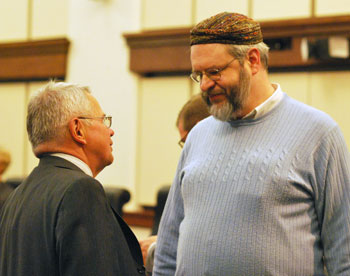Ann Arbor Transportation Authority board meeting (Aug. 24, 2011): At a meeting held at a revised time and day to accomodate board members’ summer schedules, the AATA board approved a series of resolutions, two of which related in some direct way to the possible future of transit in the Ann Arbor area.

AATA board member Roger Kerson at the board's Aug. 24, 2011 meeting. (Photos by the writer.)
At the board meeting, CEO Michael Ford announced that McKinley Inc. CEO Albert Berriz and Bob Guenzel, retired Washtenaw County administrator, will be co-chairing a panel of financial and funding experts who will review various funding options for a possible expanded, countywide transportation system.
The board voted to release a funding report to the panel – the third volume of its transit master plan (TMP). [.pdf of Part 1 of Vol. 3 Transit Master Plan Funding Options] [.pdf of Part 2 of Vol. 3 Transit Master Plan Funding Options]. The first two volumes were released previously.
The report describes a range of funding options, which would likely be used in some combination of strategies: fare revenues, advertising, property taxes, sales taxes, payroll taxes, parking taxes, stakeholder contributions, fuel taxes and vehicle license fees.
In anticipation that the panel could recommend funding options that would require voter approval, the board also approved the selection of CJI Research Corp. as the vendor for survey work over the next three years. That survey work can include on-board surveys of bus riders as well as telephone surveys of Washtenaw County voters.
At the Aug. 24 meeting, the board also approved implementation of a new website, which will provide greater flexibility for AATA staff who aren’t computer programmers to push information to the public. The new site is also intended to make it easier for the public to track the real-time locations of their bus.
The board also changed its pricing policy for the go!pass, a bus pass offered to downtown Ann Arbor employees that allows them to board AATA buses on an unlimited basis without paying a fare. The cost of the fares has historically been paid by the Ann Arbor Downtown Development Authority using public parking system revenues, plus a nominal fee per card paid by downtown employers. The revised policy breaks with AATA’s past practice of charging costs for go!pass rides based on its cheapest full-fare alternative. Those costs per ride will now be lower, based on the DDA’s ability to pay and the AATA’s estimate of what employers would be willing to pay.
In other business, the board approved a revision to its contract with the Select Ride company, which provides AATA’s on-demand paratransit service (A-Ride) for those who are not able to ride the fixed-route regularly-scheduled bus system. The upward adjustment was driven by a recent increase in maximum taxicab fares implemented by the city of Ann Arbor.
The board also approved a master agreement that will apply to all of its contracts with the Michigan Dept. of Transportation, and adjusted its capital plan to accommodate changes in three projects: the Blake Transit Center, the bus storage facility, and the bus maintenance facility. [Full Story]











